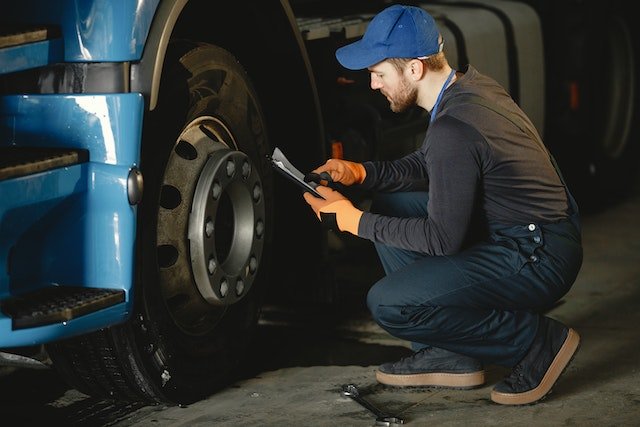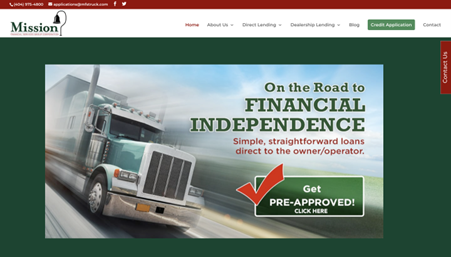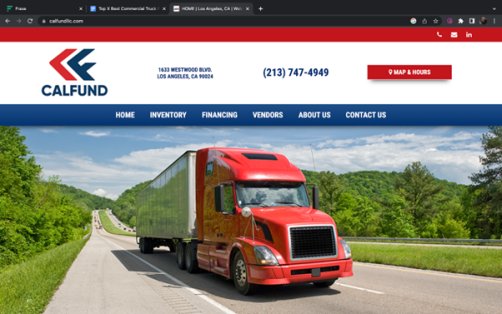So, what is the credit score needed to buy semi trucks?
Your score can play an important role in obtaining financing for your business. However, as we will discuss, this is not always the case. Often, the credit score required will depend on the lender.
Let’s discuss the typical credit score needed to buy semi trucks. We’re also going to look into other factors that can influence your loan approval, such as cash flow and monthly payments.
Read on to equip yourself with all of the credit score information you’ll need on your financing journey.
Credit Score Needed To Buy A Semi Truck
Typically, the credit score needed to buy semi trucks is around 650. Any lender will likely approve your commercial truck loan if your score is 650 or above.
But, what if your credit score is lower? In this case, you’ll be considered a high-risk borrower. You may be required to pay a higher interest rate. You also might have a less favorable commercial vehicle loan.
Some lenders don’t take credit scores into account, although they will almost certainly ask to look at them before approving your loan.
Understanding FICO Scores
To understand the credit score needed to buy semi trucks, you must understand FICO scores. FICO score ranges are a way to categorize credit scores into different levels.
The FICO score is the most widely used credit score, ranging from 300 to 850. The higher your score, the better your credit history and creditworthiness.
Here is a breakdown of the FICO score ranges in simple terms:
- 300 – 579: A score in this range is considered ‘very poor’.
- 580 – 669: A score in this range is considered ‘fair’.
- 670 – 739: A score in this range is considered ‘good’.
- 740 – 799: A score in this range is considered ‘very good’.
- 800 – 850: A score in this range is considered ‘exceptional’.
Statistically speaking, most people tend to score between 600 and 720. This means that most credit applicants fall in the fair to good range. Sometimes, a good credit score is needed to finance a semi-truck.
Semi Truck Financing With Bad Credit
At Mission Financial Services, we understand that not everyone has perfect credit.
For this reason, we don’t consider the credit score needed to buy semi trucks. Having a history of bad credit or bankruptcy does not impact our decision to approve your loan.
If you have poor credit, options like a bad credit loan are available to you. Let’s discuss the steps you can take to finance your semi truck with an imperfect credit score.
1. Complete The Credit Application
The first step in the semi-truck financing process is to complete a credit application. You’ll need to include certain documents in your application. These include pictures of the vehicle you wish to purchase, proof of truck insurance, and potentially a valid driver’s license or commercial driver’s license.
These documents help lenders to better understand your current situation. From here, they can make an informed decision regarding your loan application.
2. Provide A Spec Sheet
Next up, you’ll need to provide a spec sheet for the semi-truck you wish to purchase. If you’re looking to finance a lease agreement, rather than purchase a semi-truck, you’ll also need to provide a spec sheet.
Spec sheets document detailed information about the vehicle you want to buy, such as the motor carrier number. You can expect to include the following information in your spec sheet:
- Year: The year the truck was manufactured.
- Make: The manufacturer of the truck.
- Model: The specific model of the truck.
- Vehicle Identification Number (VIN): This is a unique 17-digit number that identifies specific vehicles.
- Mileage: The current mileage of the commercial vehicle.
- Engine: The type of engine in the semi-truck.
- Transmission Type: The type of transmission in the semi-truck.
- Accessories: Any additional features or equipment on the semi-truck, such as an auxiliary power unit, refrigerated trailer, or GPS.
Providing a detailed spec sheet will help lenders to understand the value of the semi-truck you’re interested in financing. The information on the spec sheet must be accurate and verifiable to help determine your eligibility.
3. Secure A Purchase Order
The final step in the semi-truck financing application process is to provide a purchase order for the new truck.
A purchase order is an agreement between a buyer and a seller. It outlines the details of the sale, including the cash sales price or purchase price and any applicable fees such as sales tax, DMV fees, and dealer fees.
Assessing a purchase order allows the lender to understand the total cost of the new truck. It also helps them ensure that the loan amount is sufficient to cover the purchase.
Other Factors Influencing Semi-Truck Loans
While the credit score needed to buy semi trucks can be important, depending on the lender you choose, other factors can also influence your financing eligibility. Understanding these factors will ensure a smooth and favorable loan application.
1. Driving Experience
Lenders want to ensure that you have the necessary skills and experience to operate a semi-truck safely and efficiently. A proven driving experience record can help boost your case for semi-truck financing.
For example, if you’ve been driving for 10 years, have a clean driving record, and have completed a commercial driver’s training program, this will be viewed favorably by a lender. This is applicable if you will be driving the truck.
2. Annual Revenue Stream
Lenders want to see that you have a stable source of income to make monthly payments. A steady annual revenue stream is important for self-employed individuals or small trucking business owners.
For example, can you demonstrate that your business has been profitable and that have enough cash flow to cover monthly payments? You can do this by providing bank statements. In this case, you’ll probably be viewed favorably by a lender.
3. Different Types Of Credit
Different types of credit, such as installment credit, can also help you to look favorable.
Examples of installment credit include a mortgage or business auto loan. Having a mix of different credit types, such as revolving credit and installment credit, shows lenders that you can handle different types of credit responsibly.
4. Co-signer
If the credit score needed to buy semi trucks from your chosen lender is a touch too high, the lender may require a co-signer on your commercial truck loan. A co-signer is someone willing to take on the legal responsibility of repaying the business auto loan if you cannot make the payments. The co-signer can be a family member or friend with a good credit score. Of course, they must be willing to co-sign the loan!
5. Down Payment
A down payment can make you more attractive to lenders. The down payment shows that you have skin in the game and are invested in the purchase. A larger down payment can also help you secure a lower interest rate and better loan terms on your semi-truck financing journey.
It’s important to note that different financing companies may have other requirements and may weigh these factors differently. However, by understanding these factors, you can better prepare yourself for the loan application process and increase your chances of getting commercial fleet financing.
Final Thoughts
The credit score needed to buy semi trucks varies depending on the lender.
If your chosen lender takes credit scores into account, a score of 650 and above is considered suitable for semi-truck financing. Other factors, such as driving experience and an established revenue stream, can boost your loan eligibility.
If you have an imperfect credit score, consider financing your semi truck through Mission Financial Services. We take your current situation into account, rather than your history. Contact us today to kickstart your semi-truck loan process!
























